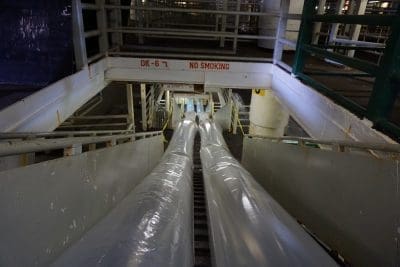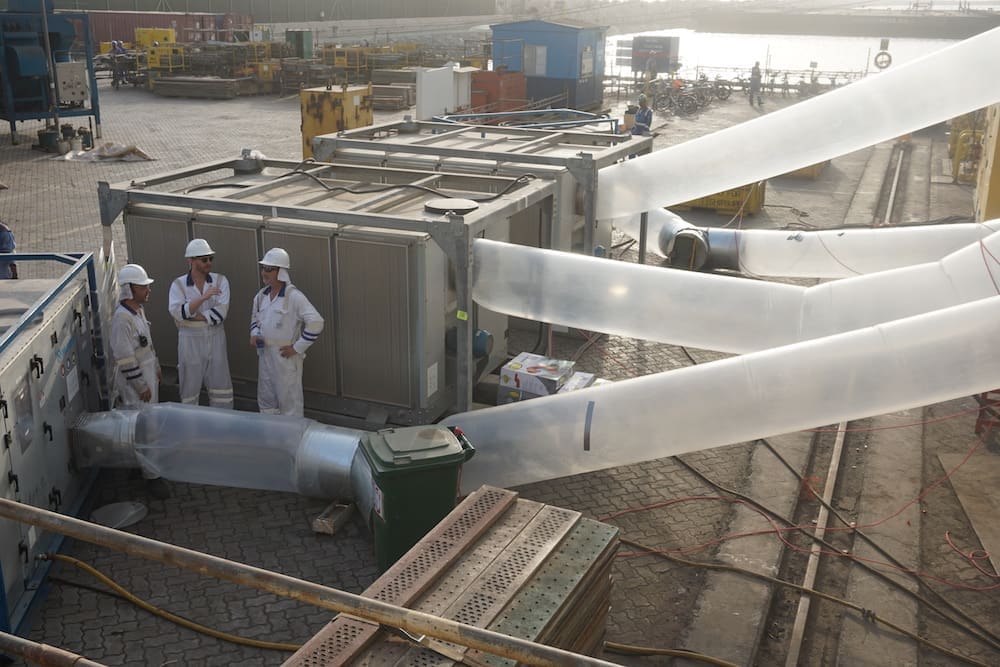A unique research trial has demonstrated that dehumidification technology can reduce temperature and humidity on a livestock export vessel, but does not yet present a practical solution for improving the welfare of exported stock, a Senate Estimates hearing in Canberra was told yesterday.
Representatives of the levy-funded livestock export research organisation LiveCorp updated senators on Tuesday on the outcomes of a trial it recently conducted involving an empty livestock export vessel at a port in Dubai.
The project was funded through a $2.2 million Federal Government grant and was designed to investigate whether dehumidification technology could effectively prevent wet bulb temperatures from rising to thresholds that can cause heat stress in livestock.
High humidity is a key factor which can cause heat stress to livestock on journeys that cross the equator.
Livecorp announced earlier this year it had embarked on its first ‘Open Innovation’ project, working with Australian company Beanstalk Agtech Pty Ltd, to conduct a global search for potential technology solutions to managing the on-board environment of live export vessels.
The process led to a static trial of dehumidification technology being conducted on an empty livestock export ship portside in the Middle East in late June.
Commercial dehumidifiers were installed on the wharf with and were used in conjunction with the existing ventilation system to achieve varying levels of heat and humidity.
Dehumidified air was piped into the vessel at different rates over several days with on board conditions throughout the vessel closely monitored throughout the trial.
 In response to questions about the trial from Senators in Canberra on Tuesday LiveCorp chair Terry Enright said the trial showed dehumidification can reduce temperature and humidity on an empty ship, which was “a good finding”.
In response to questions about the trial from Senators in Canberra on Tuesday LiveCorp chair Terry Enright said the trial showed dehumidification can reduce temperature and humidity on an empty ship, which was “a good finding”.
“However the modelling showed it isn’t a practical solution at this time, as the equipment does not have the capacity to counteract the heat generated by the sheep once they are on there.”
Asked by WA Liberal Senator Slade Brockman for more details on what the trial showed, Mr Enright said attempts to dehumidify a livestock export vessel had never been tried before.
The focus of the trial was to see if technology could bring humidity down, and if so by how much.
“From that point it then came down to measuring the practicalities of whether you could actually put these units on the ship, and that becomes an engineering problem, and then a commercial decision about whether you go forward.
Mr Enright said a decision has not yet been made on whether or how to progress the research from here.
“The report has only just recently been submitted to Government, from that point it will give us an indication of whether we go forward with looking at other options, and just what are the practicalities… it was designed to be a ‘stop/go’ approach so we don’t waste money.”
Mr Enright said LiveCorp considered the trial a success because it gained a lot of base data and valuable information to guide further research into the area.
LiveCorp CEO Sam Brown said the trial collected over 230,000 data points which have been analysed and meant the industry was now far better equipped to ask much more detailed questions.
 “The next part of our trial work would be to move to dynamic trials, where we would be looking to use chamber trials to involve livestock to replicate what we had experienced over in the Middle East when we were trialling commercially available dehumidification technology.
“The next part of our trial work would be to move to dynamic trials, where we would be looking to use chamber trials to involve livestock to replicate what we had experienced over in the Middle East when we were trialling commercially available dehumidification technology.
“There are certainly things we would like to understand more, we only used dehumidification, we didn’t used cooling, and we also have some gaps in our knowledge of the amount of heat generated by the livestock themselves.
“So there are more questions, and we have a sharper focus on the type of things we would like to ask some researchers and potentially the tech world again.”
The report from the trial, now published on the LiveCorp website, said that dehumidification can be effective in reducing heat and humidity on-board a livestock vessel. However more research and the advancement of technology was required to make the technology practically and economically viable.

